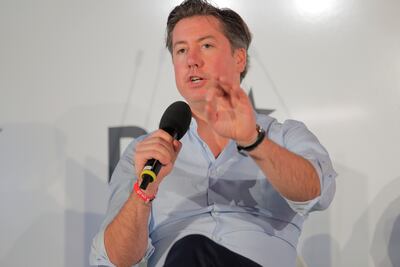Live updates: Follow the latest news on Israel-Gaza
After a breakthrough meeting between Israel's head of state with a Qatari delegation, European leaders are hoping for a Middle East-sourced resolution to a conflict that has "clear linkages" to the worldwide instability triggered by the Ukraine war.
Benedikt Franke, chief executive of the Munich Security Conference, told The National that its annual meeting had provided a platform for addressing both conflicts, as the discussions revealed ways international diplomacy was addressing the challenges. He highlighted the intense discussions between Middle East delegations, including that encounter between President Isaac Herzog and Sheikh Mohammed bin Abdulrahman Al Thani, the Qatari Prime Minister.
"I see the neighbouring countries in the region itself [taking] responsibility," he said. "They need to define the vision of the future existence. And some of the discussions here were hopeful."
As the Ukraine war enters its third year this week, the European and US allies are preoccupied with efforts to mobilise the resources to supply the front lines against the Russian invasion. With Middle East tensions already stretched far beyond Gaza, the stakes for Western diplomacy are global here too.
Developing countries don't axiomatically share the European views of the wars and with disinformation rampant, engagement is key.
"Those are two very complex situations and there are clear interlinkages," he said. "There are interrelationships geopolitically, economically, financially and even philosophically.
"I think the Gaza conflict brought a new edge to the geopolitical debate, because a lot of the global south sees it in a completely different manner to parts of the West. And again, that shows this idea that we are trying to involve the global south in all of these discussions is the only way to go.
"We've tried to have open and transparent debates about the issue of [western] double standards, which is a difficult, a massively uncomfortable one."

The deadlock in the Ukraine war, with Russia making its first advance since May after Ukraine withdrew from Avdiivka last week, makes the contest with Moscow for international support increasingly hard for the West.
"We've tried to provide platforms for countries attending to engage with countries that are here for the first time," he said.
"We've had the newly elected President of Guatemala here for the first time. We've had the President of Colombia for the first time, presidents and prime ministers from the Indo-Pacific here for the first time and we've seen an increasing willingness of transatlantic partners to engage with these countries and to try to understand the accusations that are levelled against the current rules-based international order."
One of the leading voices from the developing nations was Mia Mottley, the Prime Minister of Barbados and a campaigner for reform of the post-Second World War financial system.
"The negotiations in the climate space have become an absolutely essential issue of all debates for many reasons because it's part of the geopolitical situation now.
"There are numerous security implications of climate change that already have been seen and we need to make sure we are prepared for the future.
"We are proud to have partnered with Cop28 in Dubai. There are some very concrete financial issues to advance during the next year."
Munich Security Conference - in pictures
Axel van Trotsenburg, the World Bank's senior managing director for development policy, said the post-Cop28 agenda would support its work to support fragile states where climate change was triggering instability.
"I think for the multilateral system to be relevant it needs to be in a constant state of adapting, learning and changing," he told The National in Munich. "I think that has been certainly the case for the World Bank.
"There are two big trends over the last couple of years that are quite important for our operations. First is clearly climate change. That has become very important, as well as fragility.
"Our work in fragile states has indeed increased enormously so it's also very important that organisations like the bank stay engaged in those countries."

























